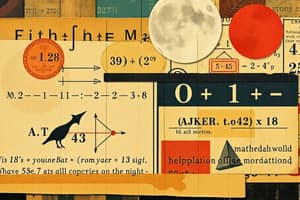Podcast
Questions and Answers
What is the primary focus of algebra?
What is the primary focus of algebra?
- Analyzing simple interest
- Calculating profit and loss
- Using symbols for unknown values (correct)
- Measuring space and change
In mathematics, what do profit and loss calculations primarily involve?
In mathematics, what do profit and loss calculations primarily involve?
- Analyzing income minus expenses (correct)
- Solving linear equations
- Finding square roots
- Manipulating expressions
What type of interest does simple interest refer to?
What type of interest does simple interest refer to?
- Non-compound interest (correct)
- Compound interest
- Linear interest
- Exponential interest
Which mathematical concept deals with quantities, structures, systems, and change?
Which mathematical concept deals with quantities, structures, systems, and change?
What does algebra use to represent unknown values in equations?
What does algebra use to represent unknown values in equations?
Which type of interest considers compounding effects?
Which type of interest considers compounding effects?
What does the formula I = P * rT represent?
What does the formula I = P * rT represent?
How can percentages be converted into decimal form?
How can percentages be converted into decimal form?
Which of the following is a valid representation of a rational number?
Which of the following is a valid representation of a rational number?
What does exponential notation use to indicate repeated multiplication?
What does exponential notation use to indicate repeated multiplication?
In the context of geometry, what does rotational symmetry refer to?
In the context of geometry, what does rotational symmetry refer to?
Why are percentages important in everyday language?
Why are percentages important in everyday language?
Flashcards are hidden until you start studying
Study Notes
Mathematics Overview
Mathematics is a vast field of study encompassing many different areas of interest and application. At its core, mathematics deals with numbers, quantities, structures, systems, processes, relations, space, and change. It serves as both a science and an art, providing tools for understanding the world around us while also allowing for creative exploration.
Subtopic: Algebra
Algebra is one of the fundamental branches of mathematics, dealing with symbols and their operations, rules, and properties. It involves using letters or other symbols along with constants and variables to represent unknown values. This allows for general solutions to problems instead of just specific ones. By using a symbolic language, algebra provides a powerful tool for solving equations, manipulating expressions, and more.
Subtopic: Profit and Loss
Profit and loss calculations within math involve the analysis of income minus expenses over given time periods. These calculations help determine whether there was profit or loss from trading activities or investments. Understanding these concepts is crucial when making business decisions and managing finances effectively.
Subtopic: Simple Interest
Simple interest refers to the amount paid by borrowers to lenders without accounting for compounding effects. A common formula used to calculate simple interest is I = P * rT where I represents the total interest earned, P stands for principal value, r denotes annual rate of interest charged per unit, and T signifies time period measured in years. This concept is important because it helps individuals understand how much money they need to pay back if they take out loans with fixed rates of interest.
Subtopic: Percentage
Percentages allow people to express proportions, ratios, and fractions in everyday language. They usually appear in the form of a fraction multiplied by 100%, such as 75% which means three quarters. To convert percentages into decimal form, you divide them by 100; so 75% becomes .75. Conversely, changing decimals into percentage can be done by multiplying by 100. Knowledge of percentages enables effective communication of numerical data.
Subtopic: Rational Number
A rational number is any number that can be expressed as a ratio of two integers—a fraction. For example, [\frac{3}{8}] is a valid representation of this type of quantity. The set of all rational numbers includes every integer and every fraction.
Subtopic: Mensuration
Mensuration deals with measurements related to geometry, particularly lengths, widths, heights, angles, surfaces, volumes etc., within objects like circles, squares, rectangles, triangles, quadrilaterals etc. Such knowledge proves useful in real life contexts such as construction projects, engineering works, interior decorating tasks, architectural designs etc..
Subtopic: Exponents
Exponential notation uses exponents to indicate repeated multiplication by the same factor instead of writing multiple instances explicitly. For instance, [x^n] indicates (nx) summations of x multiplied together. Powers ∧ mean raising to power whereas roots √ mean taking nth root.
Subtopic: Reflection and Rotational Symmetry
Reflection symmetry occurs when a figure has lines of reflection through which it appears unchanged under a flip across those mirrors. On the other hand, rotational symmetry exists when a figure retains its appearance after rotation through certain angles. Both types of symmetries play significant roles in the fields of physics, chemistry, biology, architecture, etc..
Studying That Suits You
Use AI to generate personalized quizzes and flashcards to suit your learning preferences.




